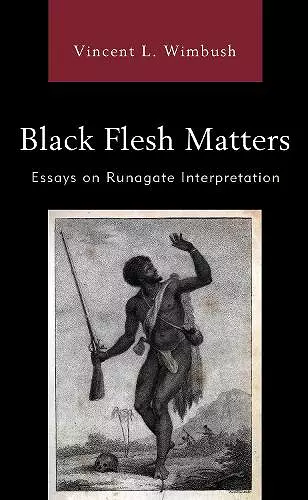Black Flesh Matters
Essays on Runagate Interpretation
Format:Hardback
Publisher:Rowman & Littlefield
Published:18th Mar '22
Currently unavailable, and unfortunately no date known when it will be back

These essays, written over more than thirty years of Vincent L. Wimbush’s career as a scholar, provide a response to the nearly universal, persistent, and sedimented modern-world hyper-signification of Black flesh, always needing to be framed, humiliated, policed, and dirtied. Because Wimbush is a scholar of religion as culture—having to do with social practices and their psycho-politics as regimes of knowledge, discourse, formation, and power relations—his ex-centric transdisciplinary interest in scriptures has been viewed, in some circles, as controversial. Yet it is Wimbush’s linkage of the modern hyper-signification of Black flesh—leading to racialization and racism, especially anti-Black racism—to the scriptural as shorthand for discourse and relations of power that makes this work compelling.
Black Flesh Matters: Essays in Runagate Interpretation, a pathbreaking collection of essays, advocates a style of biblical criticism inspired by “the world of the Black vernacular and vernacular-sensitive scholarly criticism.” It is a must-read, and not only for anyone interested in emancipatory biblical interpretation. I highly recommend it!
-- Elisabeth Schüssler Fiorenza, Harvard Divinity SchoolIn the Introduction to this collection of 30 years of writings and reflections, Vincent Wimbush says he invites the reader to "travel back with me" (16). I object. He is not inviting the reader ‘back’ to anything. He is passionately demanding us to keep ‘running’ with him. This is the better metaphor. ‘Running,’ like music, produces diverse effects. Some readers will be mortified by what Wimbush writes. I am hopefully terrified and, like Wimbush, "aim to continue to work to keep myself fit and ready to run. We all need to run. I have tried to make of this book a display of one set of terms by which the running in relation to flesh that matters too much and not at all can be carried out."
-- Kent Richards, Executive Director Emeritus, SBLBlack Flesh Matters delivers a powerful intellectual framework for the first solid way forward since the alleged American freedom from slavery 170 years ago. This book provides clear and deep paths beyond American tragedy, if we can take it in. Vincent Wimbush’s previous books, among them Scripturalizing the Human: The Written as the Political and African Americans and the Bible: Sacred Texts and Social Textures, have generated a bigger picture for us. This new book now brings together undaunted reckoning with the horror of American slavery, a clear portrait of how scripturalizing can make ‘our own future,’ and an extraordinary compiling of African American insight and imagination from the past 400 years.
We have never before seen the intensity, strength, and extent of African American intellectual resources laid out so thoroughly that this wisdom is actually available for this dispirited nation. Black Flesh Matters now supplies the thinking, ingenuity, and strategies of W.E. B. Du Bois, Toni Morrison, Chinua Achebe, Sojourner Truth, Frederick Douglass, Sterling Brown, Howard Thurman, Benjamin E. Mays, Francis Harper, Zora Neale Hurston, Bernard Bailyn, Doc Harris, Ishmael Reed, Martin Delany, Houston Baker, James Baldwin, Richard Wright, Alexander Crummel, Charles Long, Ta Nehisi Coates, Olauda Equiano, and James Weldon Johnson (among many others)—with strongly integrative and complicated analysis. Black Flesh Matters is then a book not to be missed, at the risk of great loss and even more violence. We need to hear much more from Professor Wimbush and his extraordinary scholarship and social courage; but with this latest book, his larger goals of integrating scripturalizing and the people of the Black Atlantic into hope for humanity is at hand.
The readers of Black Flesh Matters will require patience as Vincent Wimbush expects us to understand his massive and complex vocabulary, his intellectual capacities and promise, and the vast capacities of Black flesh unfolding as we take his work seriously. If some chapters are beyond some readers, I encourage you to be ready for important learning, new perspectives, social formation around every corner any way. And although the rigor of this book catches our breath regularly, be ready as well to be rewarded by his lively affect and sneaky humor.
-- Hal Taussig, Union Theological Seminary, retiredVincent Wimbush’s new book, a dazzling compendium of essays both new and not-so-new, fairly scorches the hands as one turns its pages. Taken as a whole, the arguments focus around the profound necessity to create a new canonical formation on the meanings and mandates of being African American. The call to action by Dr. Wimbush, a consummate scholar, draws upon an enormously wide-ranging referential landscape, from his own academic research in classical sacred texts to the immediacy of discourse by contemporary global writers, artists, musicians, and social critics. Early essays trace his personal journey, with its growing disaffection from the hegemony of what he terms "signifying texts," and document an accompanying and compelling drive to "unveil" prevalent discourse as a weapon of racist manipulation. Wimbush's work sets forth the necessity of unflinching truthful memory in creating radical new interpretive frameworks. In chapter after chapter, the demand is for a new mode of deconstructing, even renouncing, what is called in one place the "crucible of marginalization." The compelling case is noted as "tipping things over" as prologue to "voice finding" and new self-construction. The voice of James Baldwin, who along with W. E. B. DuBois emerges prominently in these pages, speaks of "snatching identity out of the fire." This is the work that Vincent Wimbush is about, significant life work to which he brings a Black scholar’s brilliance and passion, and from which his readers cannot turn away unscathed.
-- Ronne Hartfield, senior research fellow in religion and art, Harvard University Center for the Study of World ReligISBN: 9781978712690
Dimensions: 227mm x 160mm x 37mm
Weight: 821g
420 pages